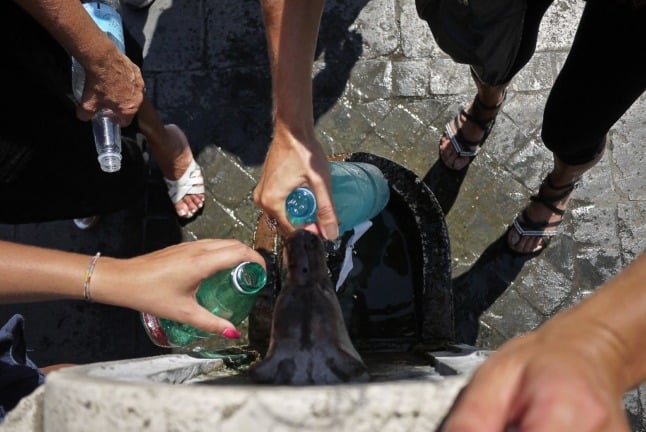Italy’s planned plastic tax, which was created in 2020 and intended to promote a reduction in the production and consumption of single-use plastics, has faced a series of delays with the government citing economic factors connected to the pandemic.
READ ALSO: What is Italy doing about the shocking level of plastic pollution on its coastline?
The tax on plastic was scheduled to come into force on July 1st this year, following a previous postponement from January of this year and July 2020 before that. It was first included in the 2020 Budget Law.
But the government has now delayed it again until January 1st 2022, while some parties aim to have it scrapped altogether.
The new delay was included in the government’s latest economic support decree law, the Decreto Sostegni bis.
Prior to its final approval by the Council of Ministers in May, the government cited economic pressure as the reason behind its decision to push the tax back again.
The Italian authorities made the move, “in consideration of the contingent and difficult conditions of the economic sectors, which would be burdened by the tax, in connection with the continuation of the epidemiological emergency from Covid-19”, stated the final draft.
EXPLAINED: How you could benefit from Italy’s Covid-19 financial support
The tax would mean those who produce or buy plastic from other European countries or import single-use plastic items, known as ‘Macsi‘, faced a tax of 45 cents per kilogram of plastic product.
Products that contain recycled and biodegradable plastic and medical containers would be exempt from the levy.
The measure was introduced to discourage the use of plastic and to promote a reduction in the production and consumption of single-use plastic products.
The postponement is a blow to the environment, as sustainability and ecological measures are once again off the agenda for now.
League leader Matteo Salvini praised the move in a tweet last month.
He said the plastic tax would put 30,000 jobs at risk, adding that his party is working to get the measure scrapped completely.
Grazie alla Lega ed al governo, rinviata (e lavoriamo perché si cancelli definitivamente) la #plastictax, una tassa che metterebbe a rischio 30.000 posti di lavoro. Volere è potere.
— Matteo Salvini (@matteosalvinimi) May 3, 2021
However, studies have shown that a greener economy could instead create new jobs.
Around 50,000 new posts could be created by 2030 as a result of the circular and green economy, a report by the Italian Association of Energy Economists (Federmanager e Aiee – l’Associazione italiana economisti dell’energia) found.
Italy’s move to delay its plastic tax comes as the EU Directive on single-use plastics is due to come into effect from July 3rd.
First introduced in 2019, the goal is to reduce plastic consumption and reduce the impact of plastic on both the environment and human health.
The EU is set to impose restrictions on certain single-use plastic products and tackle the 10 most commonly found plastic items found on Europe’s beaches.
The categories targeted are cotton bud sticks, cutlery, plates, straws and stirrers, balloons and sticks for balloons, food containers, cups for beverages, beverage containers, cigarette butts, plastic bags, packets and wrappers and wet wipes and sanitary items.
EU citizens will now need to use alternative products from next month.
“Where sustainable alternatives are easily available and affordable, single-use plastic products will be banned from July 3rd 2021,” stated the EU.
For other single-use plastic products, the EU is working to minimise their use through campaigns, design changes to products and new waste management schemes.
The aim is to recycle 90% of plastic bottles by 2029.
Prior to that, the EU plans to use 25% of recycled plastic in plastic drink bottles from 2025, increasing to 30% from 2030.
For those not complying to the Directive, it’s up to each individual member state to lay down the rules. Each country “shall take all measures necessary to ensure that they are implemented,” and any penalties should be “effective, proportionate and dissuasive,” stated the Directive.
For now, there’s no news on how Italy plans to enforce the EU directive and sanction those failing to adhere to the new rules.
Italian industry is not happy with the law, however.
Le linee guida UE su Direttiva SUP chiudono di fatto un intero settore industriale. Non vedo reazione decisa e coesa da politica, sindacati, imprese. Sembra non interessi il futuro dei lavoratori del settore del packaging, eccellenza italiana nel mondo ! #IlCoraggiodelFuturo pic.twitter.com/3oQGWTIjg4
— Carlo Bonomi (@CarloBonomi_) June 1, 2021
The president of the largest association of Italian companies, Confindustria, Carlo Bonomi, tweeted, “The EU guidelines on the SUP Directive effectively close down an entire industry sector. I don’t see a strong and cohesive reaction from politicians, trade unions, companies. The future of workers in the packaging sector, Italian excellence in the world, does not seem to be of interest.”


 Please whitelist us to continue reading.
Please whitelist us to continue reading.
Member comments